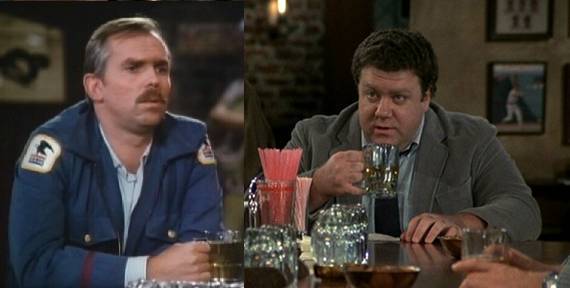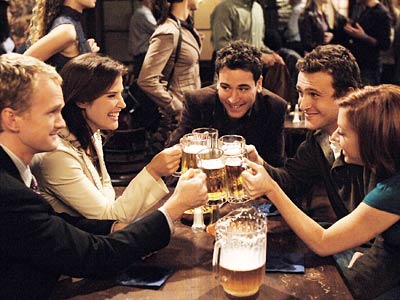Trending
Opinion: How will Project 2025 impact game developers?
The Heritage Foundation's manifesto for the possible next administration could do great harm to many, including large portions of the game development community.

Featured Blog | This community-written post highlights the best of what the game industry has to offer. Read more like it on the Game Developer Blogs or learn how to Submit Your Own Blog Post
Does the game industry's love of beer inadvertently create a glass ceiling? In this post, I look at how Execution Lab's difficulty finding female playtesters relates to larger issues about how we in the game industry network, socialize, and do business.

This has been cross-posted at www.ExecutionLabs.com.
We were playtesting at Execution Labs last week and had a bit of work finding enough female testers. In figuring out why, I came to a really weird conclusion: The game industry -from indie to AAA – is founded on beer. It is a central node that brings networks of developers together, that fuels our discussions, and cements our friendships. And this has profound effects on diversity. To figure out how this all relates, read on.
But first, a disclaimer. I love beer (particularly black IPAs) and have no intent of advocating a no-beer policy. But I do think an awareness of how the choice of drinking beer specifically and the venues and hours in which we partake of beer have a big impact on who we meet and collaborate with.

I first noticed the role of beer as a social glue when watching Capy’s Beers with Friends. They point out (and this is supported by anthropological and sociological literature on bonding over shared food and drink) that when we share beers, awesome things happen. Beer-fueled chats with friends and fellow devs can lead to tips on how to improve design, ideas for new games, and the start of future collaborations.
It’s over beers that we usually get to know each other in a more open, less formal session. As the Capy team also points out, treating investors, publishers, and middleware agents to beer is seen as an ideal way to schmooze, as once they’ve shared this bonding experience with you, they’re less likely to stiff you on a deal. (I’m not sure it this one plays out in reality. Unfortunately, there’s no academic literature to prove that drinking with that Apple guy will get your iOS game featured or closing the bar with the person from Valve will improve your Steam contract terms).
At studios here in Montreal, ‘free beer Fridays’ are a common perk to help employees unwind and socialize at the end of the work week. And, if you corner Jason Della Rocca, he’ll openly say that the pitch for Execution Labs literally started on a napkin over drinks, and this napkin is what the founders took to potential supporters. Beer and other libations played a mythic role in cementing relationships with key investors as well, notably when XL was raising the funds it needed to launch.
I’m beginning to wonder if beer is the adult equivalent of spitting in one’s hand and shaking to seal the deal. I came to this realization as XL labs teams were prepping to go to GDC and were solemnly counseled that sessions were good, but the real magic happens at the parties afterwards. Sure enough, when the teams returned and I grilled them on how it went, their most ‘successful’ moments were meeting the Unity guy, or the indie icon guy, or the publisher guy over beers. (On a side note, it was always ‘guys’, never ladies. This is perhaps because approaching lady-strangers and offering them a drink is seen as an potentially inappropriate advance rather than a calculated networking move). This was corroborated again and again by other devs I spoke to. In fact, I officially award bonus points to the indie devs hitchhiking from Canada to GDC and crashing parties, sleeping on the random floors, and making new BFFs, all whilst partaking of beers.
While I think beer’s powers as a social and corporate lubricant are pretty neat, I’m also a bit bummed out. While I like sitting around and drinking beers with friends, I will never hitchhike and crash parties. I will never get tipsy with strangers and go on crazy antics and make lifelong friendships while doing so. I’m usually in bed before midnight. Thus, I feel like I’m missing out on all these experiences that are held up as ‘magic moments’ that are essential to the fabric of ‘real’ members of the game industry.

So, here’s the deal. Not everyone drinks beer. Just like the spit-in-the-hand thing, a taste for beers is largely a guy thing (let alone a taste for hitchhiking and other assorted shenanigans that follow along). While some ladies, and family people, and older people, and non-drinking people may also like to hang out in spaces that provide beer and networking late into the night, there are surely less of them. And this is an issue. If you don’t drink, or don’t like beer, or have a family life that limits the amount of time that you can hang out after hours drinking, then you are unintentionally excluded from the informal decision-making network of the industry.
The desire to hang out late drinking beer works to inadvertently replicate an old boy’s club. The term “old-boys’ network” comes from the UK all-boys private school system. The friendships formed within those dorms and sports fields were carried forward to private gentlemen’s and country clubs. The social connections formed in adolescence became the foundation for business connections, thus creating and perpetuating a system where social elites made decisions behind the closed doors of old boys clubs, rather than in boardrooms or public forums. If you weren’t a white male from an upper-crust private school background, you were thus excluded from the venues where all the serious business transactions and conversations were happening.
I’m arguing that beer is creating a similar effect. But instead of building business networks that are rooted in privilege, it’s perpetuating specific industry demographics – i.e. if you’re not the type of person that attends events and mingles with drink-in-hand (and predominately it’s beer and not other drinks like wine served at these events) then you have a much harder time finding and forging the social relationships that help improve your craft and your career.
Bart Simon, the director of TAG, pointed out to me that, while my hypothesis that networks form around and because of beer, is cool, there’s a difference between where the magic actually happens (and whether there is actually magic) and stories about where the magic actually happens. As he puts “Whoever tells a tale about an epic early morning coffee meeting or design insight? You would seem like a dweeb. Alcohol stories are also more humble since there is a built in excuse for having dumb ideas”. He may have a point.
But, returning to my intro to this article, I have anecdotal counter-point. At XL we’re having trouble getting females to drop-by and playtest. We offer beer and pizza in exchange for an hour of trying out our games, and have no trouble finding male testers. This is not because Montreal lacks lady gamers. Trust me. But some of the other lady gamers I know suggested that it wasn’t the gaming that was the issue, it was just that hanging out on a Thursday night with pizza and beer just wasn’t their thing.
My friend Graeme suggested that we treat testing less as a basement party and more of a vernissage. After looking up what vernissage means, I think that he might be onto something. While at XL we may solve our playtesting issues by just broadening our food and drink choices, there isn’t a simple solution for the fact that we, as social beings, trust and are more apt to work with, collaborate with, and do business with people that we’ve shared food and drink with. And if you don’t hang out where this food and drinking happens, then you have a harder time networking, forging relationships, and making the ‘magic’ happen. And I’m not sure that telling people (men or women) to “get out there and force yourself to drink!” is the right solution. (You’re welcome, liver.)
Multiple factors contribute to the fact that the industry is dominated by young, single, males. Instead of blaming this solely on outright misogyny or xenophobia, we need to take more notice of the hidden structures that – unintentionally and without malice – work to reinforce a lack of diversity in the industry. What I want to know is whether there’s merit to the idea that our diversity/old boys club relates - in part - to the way we network and socialize.
In short, does our love of beer create a glass-ceiling effect in games? And if so, why do we see beer-fulled discussions as a source of creativity? Does our industry specifically self-select for extroverted alcoholics more so than other industries?
Read more about:
Featured BlogsYou May Also Like